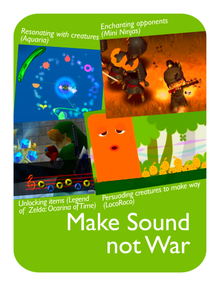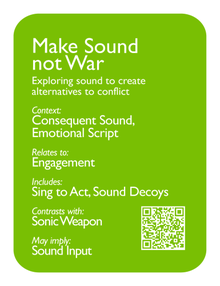Difference between revisions of "Make Sound not War"
From SoundInGames.com - Sound Design in Games
ValterAlves (Talk | contribs) m |
ValterAlves (Talk | contribs) m |
||
| Line 45: | Line 45: | ||
| ex4=<mt p="MakeSoundNotWar" g="Ocarina Of Time" altg="Ocarina of Time" w="{{R4by3W}}" h="{{R4by3H}}">the Big Boss of the Gorons is "defeated" not by force but by getting pleased with the playing of a particular song. This circumstance provides an interesting twist in the [[Emotional Script]].</mt> | | ex4=<mt p="MakeSoundNotWar" g="Ocarina Of Time" altg="Ocarina of Time" w="{{R4by3W}}" h="{{R4by3H}}">the Big Boss of the Gorons is "defeated" not by force but by getting pleased with the playing of a particular song. This circumstance provides an interesting twist in the [[Emotional Script]].</mt> | ||
| ex5=<mt p="Music" g="LocoRoco" altg="LocoRoco" i="2" w="{{R16by9W}}" h="{{R16by9H}}">LocoRoco offers a rich and delightful experience through the exploration of sound with no conflict other than avoiding to be bitten by the Moja.</mt> | | ex5=<mt p="Music" g="LocoRoco" altg="LocoRoco" i="2" w="{{R16by9W}}" h="{{R16by9H}}">LocoRoco offers a rich and delightful experience through the exploration of sound with no conflict other than avoiding to be bitten by the Moja.</mt> | ||
| + | |additional comments= | ||
| + | Nature provides many insightful examples of the use of sound to address conflicts, instead of actual physical confrontation, namely through the evaluation of the other party’s potential. The ability to perform sound – loud, long, accurate, ... – is many times an indicator of potential – health, size, maturity, ... Examples include: passerine birds singing to dispute territory, dogs barking, etc. | ||
| + | [pending: references to some interesting resources in this matter. e.g.: David Attenborough episode where he says “the winner is the one who sings the longest” (something like that)]. | ||
| + | |||
}} | }} | ||
Revision as of 04:01, 25 May 2012

|

| |
| The card's front face | The card's back face |
Synopsis
| Exploring sound to create alternatives to conflict. |
Relationships
Context:
Consequent Sound ![]() , Emotional Script
, Emotional Script ![]() .
.
Relates to:
Engagement ![]() .
.
Includes:
Sing to Act ![]() , Sound Decoys
, Sound Decoys ![]() .
.
Contrasts with:
Sonic Weapon ![]() .
.
May imply:
Sound Input ![]() .
.
Description
In a moment when so many games tend towards belligerent narratives, it is relevant to think of audio as a creativity opportunity, also to come up with ideas that offer alternatives to those types of conflict.
Examples
  Ocarina of Time: the Big Boss of the Gorons is "defeated" not by force but by getting pleased with the playing of a particular song. This circumstance provides an interesting twist in the Emotional Script.
|
Additional Comments
- Nature provides many insightful examples of the use of sound to address conflicts, instead of actual physical confrontation, namely through the evaluation of the other party’s potential. The ability to perform sound – loud, long, accurate, ... – is many times an indicator of potential – health, size, maturity, ... Examples include: passerine birds singing to dispute territory, dogs barking, etc.
- [pending: references to some interesting resources in this matter. e.g.,: David Attenborough "the winner is the one who sings the longest" (something like that)].
External Resources
- Spore's Siren Song http://spore.wikia.com/wiki/Siren_Song and Soothing Song http://spore.wikia.com/wiki/Soothing_Song
- ancient rituals of confrontation through vocalizations
- Baraka 12:29 (chapter 4)



